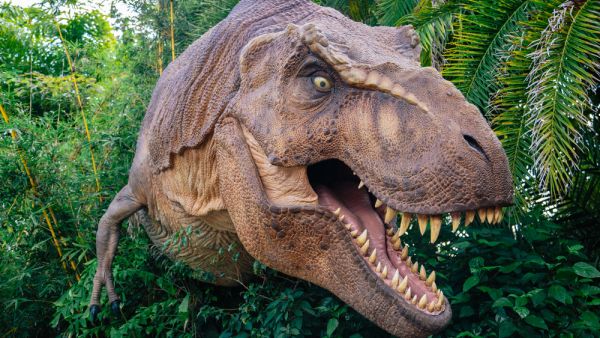US technology company Neuralink could create 'novel exotic species' of dinosaurs in just 15 years, according to Max Hodak, one of its co-founders.
Hodak is an American entrepreneur and technologist who co-founded the contentious neurotechnology firm with Elon Musk.
The firm, known for putting a computer chip in the brain of a pig, could 'probably build Jurassic Park' if it wanted to, Hodak said, in reference to the 1993 blockbuster film.
Neuralink is currently working on technology that aims to allow people to hook their brains up to a computer and effectively become cyborgs.
Quarantine project:
— jillybean (@TexasJillybean) July 21, 2020
Rebuild all of the LEGO sets my son owns. Minecraft sets are done ?, next up, Star Wars and Jurassic Park ??♀️
Side note, I’ve figured out where all my money went these past 10 years ? pic.twitter.com/1tblMnfna3
'We could probably build Jurassic Park if we wanted to,' Max Hodak tweeted.
'Wouldn't be genetically authentic dinosaurs but [shrugging emoji]. Maybe 15 years of breeding + engineering to get super exotic novel species.'
Hodak didn't elaborate regarding how the firm's own version of Jurassic Park would be built, but went on to suggest that it could help biodiversity.
'Biodiversity (antifragility) is definitely valuable; conservation is important and makes sense,' he also tweeted.
'But why do we stop there? Why don't we more intentionally try to generate novel diversity?'
Hodak appeared to be undeterred by the events of the film, based on the 1990 novel by Michael Crichton and starring Sam Neil, Laura Dern and Jeff Goldblum.
It depicts the disastrous results of genetic scientists bringing dinosaurs back from extinction at the eponymous park on an island near Costa Rica.
In the film, dinosaur cloning was accomplished by extracting dinosaur DNA from prehistoric mosquitoes preserved in amber.
But due to a breakdown in the park's security system, dinosaurs including a fearsome Tyrannosaurus rex and a venon-spitting Dilophosaurus go on the rampage.
YouTuber Takarazuka recently began a playthrough of Return to Jurassic Park on their channel. We hope you will show them your support as they wrangle dinosaurs and try to rebuild John Hammond's dream.https://t.co/9LePGdbnRr
— JW Evolution (@JW_Evolution) December 7, 2020
The billionaire philanthropist and creator of the park, played by the late Richard Attenborough, is ultimately responsible for several fatalities, as well as the near-deaths of his two grandchildren who presumably lived with the traumatic experience of being nearly mauled by raptors for the rest of their lives.
Neuralink, founded in 2016, is probably best known for its work on making a 'whole brain interface' – essentially a network of tiny electrodes linked to your brain that the company envisions will allow us to communicate wirelessly with the world.
It would enable us to share our thoughts, fears, hopes and anxieties without demeaning ourselves with written or spoken language, the firm claims.
Neuralink has already courted criticism, partly for its experiments on living animals – last year, Elon Musk unveiled a pig with an implant in its brain.
In a webcast, Musk showed off the animal, named Gertrude, with the coin-sized neural implant, called Link, which the firm wants to implant in humans.
While Gertrude snuffled around in a pen, viewers saw her brain activity on a large screen.
Earlier this year, Musk claimed he has put a Neuralink implant in a monkey's brain and that the animal can play video games 'with his mind' in a wide-ranging online question and answer session.
In a Q&A on Clubhouse, a private social app, Musk claimed the implant builds a digital link between the brain and a computer, describing it as 'like a fitbit for the skull'.
Musk believes allowing human brains to interface with computers will help humans avoid being outpaced by artificial intelligence (AI).
He has previously called AI 'potentially more dangerous than nukes' and has called the lack of AI regulation 'insane'.
This article has been adapted from its original source.








